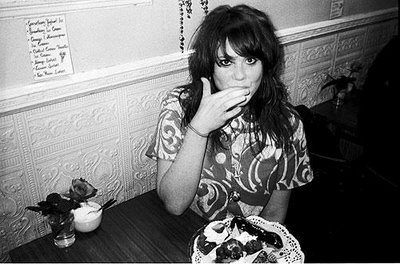Hey mummy, what's a sex pistol?
 I don't know a lot about art, but I know what I like. You can't help but think that's exactly what four supermarkets thought when they saw the cover art for the Manic Street Preachers' new album, Journal for Plague Lovers, above. 15 years on from the release of their opus, The Holy Bible, the vast majority of the lyrics for which were written by Richey Edwards, who went missing less than a year later, the band have finally had the courage to return to the remaining lyrics which he left behind for them. Appropriately, they decided upon using a painting by the artist Jenny Saville, who also provided a confrontational cover for the THB, a triptych of an obese woman in white underwear. The art for JFPL is undoubtedly striking; it's also quite clearly one of the best album covers in years.
I don't know a lot about art, but I know what I like. You can't help but think that's exactly what four supermarkets thought when they saw the cover art for the Manic Street Preachers' new album, Journal for Plague Lovers, above. 15 years on from the release of their opus, The Holy Bible, the vast majority of the lyrics for which were written by Richey Edwards, who went missing less than a year later, the band have finally had the courage to return to the remaining lyrics which he left behind for them. Appropriately, they decided upon using a painting by the artist Jenny Saville, who also provided a confrontational cover for the THB, a triptych of an obese woman in white underwear. The art for JFPL is undoubtedly striking; it's also quite clearly one of the best album covers in years.Quite why the four supermarkets think that a painting of a young girl (as it is, although like with THB's art Saville has gone with both ambiguity and androgyny) that, if you don't look closely enough, has a tear rolling down her bloodied face is so potentially disturbing or challenging that it needs to be hidden behind a plain slipcase is perplexing. Presumably the defence they would rely on is that it potentially depicts an abused, bruised and frightened child, a startling image that some would find upsetting, or difficult to explain to a child and which might seem out of place staring down amidst the distinctly unchallenging covers from the CD aisle. You would imagine that would be their argument: as it is, all Asda have said is that it "wanted to be extra cautious" in case it upsets any customers, while Sainsbury's said it "felt that some customers might consider this ... to be inappropriate if it were prominently displayed". In other words, they haven't a clue how the public is likely to react; they just think that some might not like it.
In a bid to see whether they're at least being consistent, I had a look on their websites to see if they were showing the same caution online as they are in-store. To Tesco's credit, or cowardice, whichever you prefer, they aren't using Saville's painting for their main CD page link to the album, although on its actual page it's there in all its glory. Asda however, despite being "extra cautious" in store, and in fairness to them their corporate parent Wal-Mart is notoriously sensitive to which CDs and magazines it stocks in America, even when it's also the nation's biggest seller of ammunition, has the art uncensored on their main CD page. Sainsbury's and Morrisons don't seem to yet have pages up for it.
The Manics' singer quite reasonably points out that "[Y]ou can have lovely shiny buttocks and guns everywhere in the supermarket on covers of magazines and CDs, but you show a piece of art and people just freak out". Although there have been occasional campaigns to censor the front pages of "lads mags", and they're usually put on higher shelves and sometimes at least half covered, it's rare that the front pages of the likes of the Daily Star and Sport are similarly felt to be "inappropriate", despite the abundance of flesh which usually beams out from both. As for CDs, a quick browse through the current week's top 40 has some album covers which would more than benefit from being placed in a plain slipcase, and which could well offend some of the more delicate souls out there. These though are photographs of the artists themselves, although whether that word can possibly be used to describe the Pussycat Dolls should be left perhaps to the more inventive swearbloggers out there. Surely no one could possibly find inappropriate a spreadeagled P!nk, a vomit inducing horrendous photoshop disaster featuring the gorgeous pouting Dolls, or a presumably distinctly deliberately unsexy shot of Alesha Dixon in fishnets, could they? After all, these are artists which appeal directly to the supermarket demographic, where the crap is piled high and sold cheap. The Manics, who might have once been mainstream but have rather faded from their height and have followed up one of their most accessible albums with one which is the diametric opposite, are unlikely to sell by the bucketload, and so their record company and they will need every last sale. Hence they can be bossed about.
With the downfall of record shops, and the spectre of even the likes of HMV eventually falling victim to the internet, there is the danger that anything outside the vast selling stars starts to become completely ghettoised. Doubtless this will appeal to the genre nerds who already stop liking bands they formally idolised once they breakthrough, but it also threatens to greatly compromise what has always been great about music, as of everything else: the iconoclasts who genuinely do push things forward. Once, as alluded to in the song from JFPL, Jackie Collins Existential Question Time, the Sex Pistols were seen as so threatening that they were banned; it's surely a sad state of affairs that in 2009 an album cover which is simply a portrait is censored lest anyone be upset should they see it.
Labels: bullshit, censorship, Manic Streets Preachers, music, shit music, supermarkets


